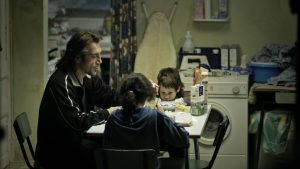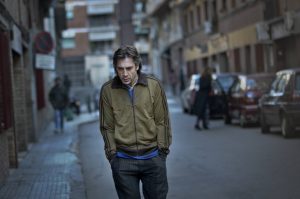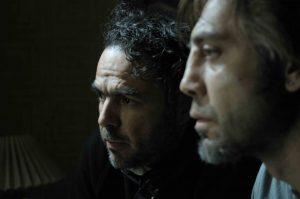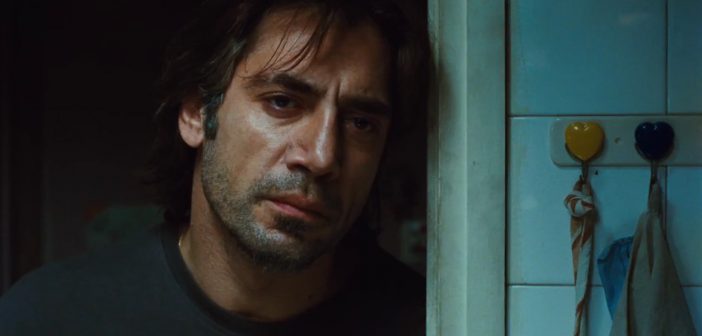Internationally renowned as one of the most photographed cities, Alejandro González Iñárritu’s depiction of Barcelona in Biutiful (2010) is a far cry from the Catalan capital’s conventional portrayal on screen. Neglecting all imagery as a picturesque holiday destination, it exposes the city’s darkest and grittiest corners, with only momentary snapshots of the iconic Sagrada Família and Plaça Reial confirming the film’s location. Whilst both can boast exceptional performances from Javier Bardem, Biutiful certainly is world’s away from Woody Allen’s jaunty and insouciant, Vicky Cristina Barcelona (2008).
Awarded with the ‘Best Foreign Language Film of 2010’, Biutiful is a flawless alliance of the wonderfully talented Javier Bardem, perhaps best known for his role as the remorseless sociopath in No Country for Old Men (2007), and one of the most well-regarded and critically acclaimed filmmakers of his generation, Alejandro González Iñárritu. Iñárritu’s partiality towards unmasking the dark side of the human condition, as seen in his Oscar-nominated Babel (2006), is superbly paired with Bardem’s sorrowful magnetism, in exhibiting the heart-rending life of Uxbal.
 Biutiful recounts the harrowing final weeks of the perturbed single father, and well-intentioned street hustler, Uxbal, who struggles to cope with the demands of daily life. Following his prognosis of terminal prostate cancer, his attempts to ensure a secure future for his two young children know no bounds, leaving him unable to extricate himself from an intricate web of crime. From his management of Barcelona’s notorious Senegalese sellers to his involvement with corrupt Chinese gang masters, Uxbal finds himself drowning in a pool of petty criminality and moral decay. That is until his sincere gesture metamorphoses into a catastrophic incident, as a result of a toxic heating-unit malfunction, making Uxbal at least partially responsible for the death of an unspecified, yet substantial, number of Chinese immigrants.
Biutiful recounts the harrowing final weeks of the perturbed single father, and well-intentioned street hustler, Uxbal, who struggles to cope with the demands of daily life. Following his prognosis of terminal prostate cancer, his attempts to ensure a secure future for his two young children know no bounds, leaving him unable to extricate himself from an intricate web of crime. From his management of Barcelona’s notorious Senegalese sellers to his involvement with corrupt Chinese gang masters, Uxbal finds himself drowning in a pool of petty criminality and moral decay. That is until his sincere gesture metamorphoses into a catastrophic incident, as a result of a toxic heating-unit malfunction, making Uxbal at least partially responsible for the death of an unspecified, yet substantial, number of Chinese immigrants.
 Nonetheless, as Uxbal mournfully recalls the horrific circumstances of his situation, to his spiritual confidante, viewers are encouraged to sympathise with this exploitative character, and perceive his criminal behaviour as nothing less than flaws of his resilient dedication to his family. Perhaps, if it had not been for this film’s exquisite self-confidence, Uxbal’s unrestrained self-pity would not be so well received.
Nonetheless, as Uxbal mournfully recalls the horrific circumstances of his situation, to his spiritual confidante, viewers are encouraged to sympathise with this exploitative character, and perceive his criminal behaviour as nothing less than flaws of his resilient dedication to his family. Perhaps, if it had not been for this film’s exquisite self-confidence, Uxbal’s unrestrained self-pity would not be so well received.
 His personal difficulties are exacerbated by his overtly sexual and mentally erratic ex-wife. Played by the remarkable Maricel Alvarez, Marambra continuously seeks the approval and respect of Uxbal, yet her carefree attitude and manic depressiveness fail to convince him that she is a stable maternal figure to their children. In addition to Marambra’s questionable parenting abilities, her sexuality is central to her role. Not only does she use it to manipulate Uxbal, in order to facilitate her relationship with her children, but simultaneously with his brother, Tito, in return for a place to stay.
His personal difficulties are exacerbated by his overtly sexual and mentally erratic ex-wife. Played by the remarkable Maricel Alvarez, Marambra continuously seeks the approval and respect of Uxbal, yet her carefree attitude and manic depressiveness fail to convince him that she is a stable maternal figure to their children. In addition to Marambra’s questionable parenting abilities, her sexuality is central to her role. Not only does she use it to manipulate Uxbal, in order to facilitate her relationship with her children, but simultaneously with his brother, Tito, in return for a place to stay.
In Iñárritu’s quintessential style, the non-linear temporality of Biutiful mirrors that of his previous successes, Amores Perros (2000), 21 Grams (2003) and Babel. The film opens with Uxbal lying in bed with his daughter, Ana, as she tries on his mother’s diamond ring, before the focus shifts to a dream-like scenario, whereby he appears in a snow-laden forest. However, in place of Iñárritu’s usual fractured and multi-layered narrative, Biutiful solely dedicates itself to conveying the agonising story of Uxbal’s melancholy life. Rather, additional dimensions are injected into this film through magical realism, with Uxbal’s disconcerting yet powerful capacity to communicate with the afterlife.
 The striking cinematography of Rodrigo Prieto, spectacular as always, evokes a crepuscular Barcelona, penetrated by darkness and immigrant drudgery. His shrewd use of handheld cameras, saturated in the subdued tones of grey and blue, meticulously capture Uxbal’s battle to survive on the margins of life and death. With this, Prieto ensures that viewers are dragged hand in hand with Uxbal through the dangerous criminal underworld of contemporary Barcelona and its many tragedies.
The striking cinematography of Rodrigo Prieto, spectacular as always, evokes a crepuscular Barcelona, penetrated by darkness and immigrant drudgery. His shrewd use of handheld cameras, saturated in the subdued tones of grey and blue, meticulously capture Uxbal’s battle to survive on the margins of life and death. With this, Prieto ensures that viewers are dragged hand in hand with Uxbal through the dangerous criminal underworld of contemporary Barcelona and its many tragedies.
The Mexican-born director conveys his sheer brilliance as a creator of unique imagery throughout the film. His artful and pioneering take on exposing Barcelona’s gritty underbelly emphasises the prevalent, yet concealed, unglamorous side to Barcelona- a city shown to be brimming with seedy streets, crime and poverty. He promotes the unfortunate foundation of cities, societies and countries all around the world, rather than masking them with the enviable lives of the bourgeois, as so many films do.
 All in all, there is no doubt that Biutiful is magnificent filmmaking, and unquestionably some of the best work of Javier Bardem and Alejandro González Iñárritu. Bardem simply excels with his organic portrayal of an unorthodox hero, and the film’s poetic story of eternal love and fatherhood will undoubtedly move and touch viewers from all walks of life. However, it is thanks to Iñárritu’s gifted craftsmanship that this modern classical tragedy was so judiciously able to unveil even the ‘biutiful’ Barcelona’s dark side.
All in all, there is no doubt that Biutiful is magnificent filmmaking, and unquestionably some of the best work of Javier Bardem and Alejandro González Iñárritu. Bardem simply excels with his organic portrayal of an unorthodox hero, and the film’s poetic story of eternal love and fatherhood will undoubtedly move and touch viewers from all walks of life. However, it is thanks to Iñárritu’s gifted craftsmanship that this modern classical tragedy was so judiciously able to unveil even the ‘biutiful’ Barcelona’s dark side.





11 Comments
Just got back from Barcelona last weekend- safe to say the Barcelona in this film sounds very different to the sunny city my husband and I fell in love with!
Watched this film a couple of years ago, loved it. I’m a big fan of Iñaritu’s work and I think ‘Biutiful’ is a truly eye opening film, and, as put in this article, informs people about the ‘dark’ side to Barcelona. Often we think of it as a glamorous cosmopolitan city and holiday destination- all beach and nothing more. We forget about the many issues facing the city, and I remember from my trip to Barcelona a couple of years ago, that street sellers were a huge problem. Truly remarkable work from Bardem and Iñaritu
Loved this article and love Javier Bardem’s films. Will definitely be watching Biutiful, sounds very intriguing
Great film. Iñaritu does a wonderful job of showing that Barcelona is not all glitz and glam
Great film, very moving thanks to Bardem’s wonderful performance. Watched it about 5 years ago, not long after it came out, and I always think about it whenever my husband and I go to Barcelona (which is about 3 times a year- can’t get enough of it!!).
@barcelona connect- really enjoyed reading this article as well. Brings attention to some really important messages.
It’s so important that people make and watch films like Biutiful. In this film, we witness a side to Barcelona that people often neglect. Barcelona is known for its wonderful beaches and Gaudi architecture but the city’s poverty, unemployment, number of homeless people, immigrants etc is quite frankly apalling and of great concern. I moved to Barcelona about a year and a half ago and I work for a homeless charity and I really would encourage others living here to get involved.
Found this article amongst my search for our upcoming trip to Barcelona! Fascinating article and would love to watch this film, sounds really interesting.
Truly eyeopening article
Our perception of the ‘real’ Barcelona is often distorted by films like Vicky Cristina Barcelona, but is that in fact the real Barcelona? Biutiful deals with issues central to the city, such as poverty and crime. In fact, Barcelona is has one of the highest pickpocketing rates of all European cities. Is this seen in VCB? No. Biutiful gives an insight into the real Barcelona and life in the city’s working class suburbs
Thanks for the article. Sounds like a really interesting watch
Watched this film after reading this article. Must say, I really recommend it to anyone else out there. Barcelona in a completely unrecognisable light. Really fascinating watch.